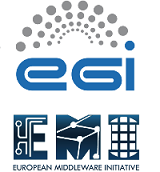Speaker
URL
CHAIN Web: www.chain-project.eu
GISELA Web: www.gisela-grid.eu
EUMEDGRID-Support: www.eumedgrid.eu
EUIndiaGrid2: www.euindiagrid.eu
Description of the work
CHAIN aims to further coordinate and leverage the experience of several e-Infrastructures Initiatives addressing various regions of the World and specifically those emerging in Asia and Africa, but also Latin America and Mediterranean.
CHAIN focuses on the harmonised and optimised interaction model for e-Infrastructure and specifically Grid interfaces between Europe and the rest of the world.
The interoperations among regional infrastructures both at the operational and organizational levels will be one of the major goals.
The project, started on 1st December 2010, is now focused on two milestones related to:
• Collecting the information on the state of the art of regional grid infrastructures and their organisational structures worldwide, in a unified format. This information will be further used to develop the first model for world-wide collaboration in e-Infrastructures and Grids in particular;
• Contact VRCs that can be considered of intercontinental span and/or willing to aggregate people and resources (computing, data repositories, etc.) from different regions of the world, to validate the above-mentioned model.
GISELA (www.gisela-grid.eu), which started on 1st September 2010, aims at
• Ensuring the long-term sustainability of its e-Infrastructure in Latin American and the Caribbean by implementing the NGI / LGI sustainability model proposed by EELA-2 (www.eu-eela.eu), in association with CLARA and collaborating with EGI.
• Providing full support to the EELA-2 User Communities whose research investigations are carried out at the institution level or in small collaborations, and to the larger VRCs spanning Latin America and Europe and using this Infrastructure.
Schedule of the Workshop:
Session A: (90 mn: 4 presentations + 20 mn discussion)
- Biology VRC: WeNMR (A. Bonvin) and HealthGrid (Y. Legré): 30 mn
- Geosciences (M. Petitdidier): 20 mn
- Digital Cultural Heritage VRC – DC-NET & INDICATE projects (A. Fresa): 20 mn
Session B: (90 mn: 3 * 20 mn presentations + 30 mn discussion)
- EGI to present its VRC coordinating role with the Resource Infrastructure Providers (as discussed in the Amsterdam meeting)
- GISELA to present its VRC framework for LA (e.g. Dissemination, customized Training, new Services,..)
- CHAIN to present its VRC framework for the RIPs it represents (EUMEDGRID, EUIndiaGrid2,...)
Overview
Have a well-prepared and organized discussion on what the Users Communities require from Resource Infrastructure Providers (RIP) and the planning of regional infrastructures to cope with such requirements. Specifically, the following main objectives will be addressed during two 90 minutes sessions:
1. Session A: Collect from a few exemplar VRCs, their requirements as of the support to be provided by the RIPs. Presentations will focus on the requirements and the ways in which they can be matched with availability of resources from Regional Grid Infrastructure, including Computing, Storage, Network, Science Gateways, Training Events, Dissemination, etc. Presentations will also aim at explaining the organisational aspects of collaboration between a Virtual Research Community and the RIPs.
2. Session B: Present to the VRCs the current RIPs work-plan to put in place a comprehensive VRC Support scheme, concentrating on the state of the art of services that are (or can be) provided to VRCs and stimulating the discussion on the basic and advanced services that can match their requirements. The CHAIN presentation will also introduce the questionnaires prepared in order to gather up-to-date and exhaustive information from the relevant actors (Regional Infrastructures, NGI, User communities) and first impressions from the preliminary analysis of the feedbacks received. The work-plans for the future will also be shown.
Projects supporting the workshop: CHAIN, GISELA, EUMEDGRID-Support, EU-IndiaGrid2, ..
Conclusions
EGI, CHAIN, GISELA and other projects will make use of the outcomes of the workshop to better address the issues related to the involvement of virtual research communities in the usage of Grid infrastructures.
Impact
The workshop is expected to make a step forward in the matching of user communities’ requirements and infrastructure providers’ plans. Hopefully it will help to pinpoint the critical issues and the necessary technical developments, if any, that still need to be addressed in order to fulfil the requirements of the VRCs.

